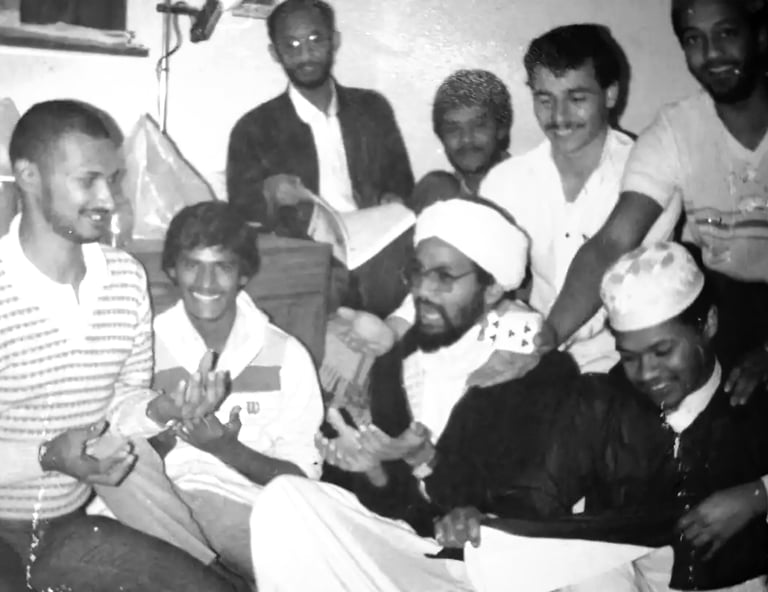PRESERVING CAPE HERITAGE AND CULTURE THROUGH EXPLORING VISUAL ARTS AND EDUCATION
Rituals and Reverence: The Spiritual Practices of the Cape Malay Community
The Cape Malay Heritage, deeply rooted in Islam, is a rich tapestry of spiritual traditions and practices that have been passed down through generations. These traditions not only strengthen the community's faith but also preserve a unique cultural identity. Among these practices, Thursday Thikr nights, the Ratib-ul-Gadaat, the Ratiep, and the Mawlud hold a special place. Waheedah Smith explores the spiritual traditions and significance of the Cape Malay community.
THROUGH YOUR PEN
Waheedah Smith
7/11/20243 min read


Thursday Thikr Nights
Thursday thikr nights are a weekly spiritual gathering where Cape Malay Muslims come together to engage in the remembrance of Allah (God). Thikr, derived from the Arabic word "dhikr," means "remembrance" and involves the repetitive chanting of divine names, praises, and supplications. This practice is not only a means of spiritual purification but also fosters a deep sense of community and connection among participants.
During these gatherings, individuals recite verses from the Quran, sing devotional songs (qasidas), and engage in collective prayers. The rhythmic and melodic recitations create a meditative atmosphere, allowing participants to reflect on their faith and seek closeness to the divine. Thursday Thikr nights serve as a vital spiritual rejuvenation before the sacred day of Friday (Jumu'ah), reinforcing communal bonds and spiritual resilience.
The Ratib-ul-Gadaat
The Ratib-ul-gadaat is a specific form of Thikr unique to the Cape Malay community. This ritual, deeply embedded in Sufi traditions, involves the chanting of particular litanies and invocations, often accompanied by rhythmic movements and gestures. The term "ratib" refers to a set of structured recitations, while "gadaat" signifies the gathering or congregation.
Performed in mosques or private homes, the Ratib-ul-gadaat is usually led by a spiritual guide or a senior member of the community. The participants, seated in a circle, recite in unison, creating a harmonious and spiritually uplifting experience. This practice not only enhances individual spirituality but also reinforces the collective identity and unity of the Cape Malay Muslims.
The Ratiep
The Ratiep, or Ratiep ritual, is one of the most visually striking and spiritually intense traditions within Cape Malay culture. It is a form of spiritual exercise that involves the use of symbolic instruments, such as swords and spikes, to demonstrate faith and devotion. Rooted in Sufi mysticism, the ratiep is performed to commemorate and honor the sacrifices of early Muslim saints and martyrs.
During the Ratiep, participants enter a trance-like state through rhythmic chanting, drumming, and vigorous movements. In this heightened state of spiritual ecstasy, they engage in acts of self-inflicted harm, such as piercing their bodies with skewers or striking themselves with swords, without experiencing pain or injury. This phenomenon is seen as a manifestation of divine protection and the participant's deep spiritual connection.
The Ratiep serves as a powerful reminder of the strength of faith and the enduring legacy of sacrifice in the Cape Malay community. It is typically performed during significant religious occasions, such as the Islamic month of Rabi' al-Awwal, which marks the birth of the Prophet Muhammad (PBUH).
The Mawlud
The Mawlud, or Mawlid al-Nabi, is the celebration of the birth of the Prophet Muhammad (PBUH). For the Cape Malay community, the mawlud is a time of joyous festivity, spiritual reflection, and communal solidarity. This event is marked with recitations of the Prophet's biography, poetry, and songs praising his virtues and life.
During the Mawlud, families and communities gather to share meals, distribute sweets, and engage in acts of charity. Special sermons and lectures are held in mosques, emphasizing the moral and spiritual teachings of the Prophet Muhammad (PBUH). The celebration is not only an expression of love and reverence for the Prophet but also a reaffirmation of the community's commitment to his teachings and the values of Islam.
In conclusion, the spiritual practices of the Cape Malay community, including Thursday Thikr nights, the Tatib-ul-gadaat, the Ratiep, and the Mawlud, are profound expressions of faith and cultural identity. These traditions, deeply rooted in Sufi mysticism and Islamic devotion, continue to shape the spiritual landscape of the Cape Malay Muslims, fostering a sense of unity, resilience, and reverence. Through these rituals, the community preserves its rich heritage and passes it on to future generations, ensuring that the spiritual essence of the Cape Malay culture remains vibrant and enduring.




Copy QR Code to easily share the article
Discover
Contact Us
Our cultural heritage matters
Help us learn and grow by sharing your respectful feedback on our website, exhibitions, social media and more:
Store's Terms and Conditions
